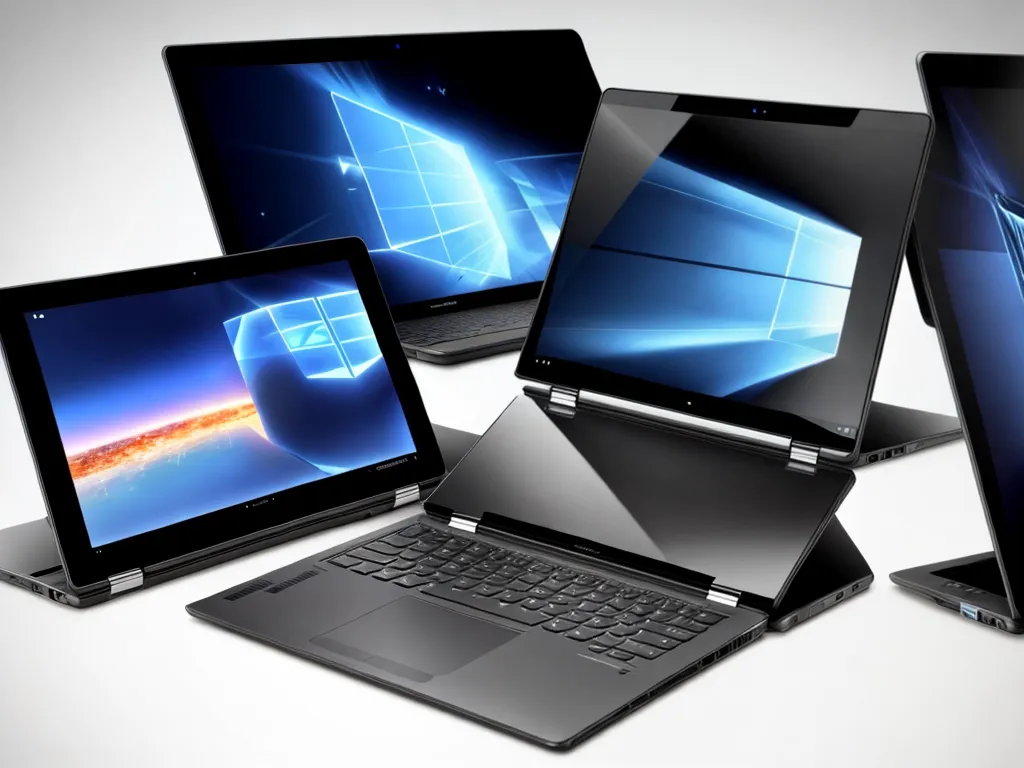
Are Foldable Laptops the Future?
Foldable laptops represent an exciting new form factor that could reshape the future of personal computing. As foldable smartphone displays have become more common in recent years, manufacturers are now bringing the same flexible display technology to larger devices like tablets and laptops.
What Are Foldable Laptops?
A foldable laptop is a laptop computer with a flexible display that can be bent or folded. This allows the device to transform between different configurations:
- A regular clamshell laptop with a keyboard and screen.
- A tablet, with just the screen visible.
- A tent mode, with the screen upright and keyboard folded behind.
The key component enabling this is the foldable display. Rather than a rigid glass panel, these use newer display technology like OLED or flexible LCDs that can bend repeatedly without breaking. The hinge and body around the screen are also designed to flex and shift shapes.
How Do Foldable Laptop Displays Work?
There are a few leading display technologies that make a truly foldable laptop screen possible:
-
Plastic OLED (PMOLED) uses a flexible plastic substrate instead of rigid glass. This allows the display layer to bend repeatedly.
-
Flexible LCDs use very thin glass that can bend when layered with flexible substrates and adhesives.
-
Micro-LED arrays on a flexible base also allow for folding. This tech is still emerging.
The key is that the display can bend and fold hundreds of thousands of times without failing. The materials and internal layers flex rather than cracking under stress.
What Are the Benefits of a Foldable Laptop?
There are some compelling advantages to the foldable laptop design:
-
Portability – A folding laptop can shrink down to tablet size for easier transport and mobility.
-
Versatility – The multiple modes suit different use cases, like using as a tablet or propping up the screen.
-
Large Screen – Unfolded, the flexible display enables a laptop-sized screen that wouldn’t fit in a pocket.
-
Durability – Repeated folding may be more durable than a conventional hinge.
For people who value portability and versatility, foldable laptops present an intriguing new option.
What Foldable Laptops Are Available?
Foldable laptops are an emerging category, with more expected to launch in 2023 and beyond. Here are some of the early models:
-
Lenovo ThinkPad X1 Fold – A 13.3″ OLED screen folds down into a compact 9.6″ tablet. Launched in 2020.
-
HP Elite Folio – A 13.5″ foldable 2-in-1 laptop running Windows 10. Released in 2021.
-
Asus Zenbook 17 Fold – Asus’ 17.3″ foldable OLED laptop flexes between laptop and tablet modes.
-
Dell Concept Ori – Dell’s foldable tablet/laptop prototype with 12.5″ screen. Not a final product yet.
More brands like Microsoft, Samsung, and Intel have foldable laptop concepts and patents signaling new future entries.
What are the Downsides to Foldable Laptops?
As with any new form factor, there are still some disadvantages and compromises:
-
Durability – Long-term durability remains unproven over years of use.
-
Price – The flexible displays cost more, so foldable laptops are expensive, often over $2000.
-
Thicker Folded – The display layers make the closed device thicker than a normal laptop.
-
Component Placement – Fitting all components into folding designs requires tradeoffs.
Manufacturers still have hardware challenges to optimize in areas like the hinge, chassis materials, and internal component layouts.
Are Foldable Laptops the Future?
It’s too early to make definitive claims, but foldable laptops have enormous potential to redefine the category. As manufacturers solve durability concerns, refine designs, and lower prices, foldable laptops could become the next evolution after 2-in-1 convertible PCs. Their versatility and portability perfectly match the needs of mobile users today.
Within 5 years, foldable laptops could move from the early adoption phase to the mainstream if major brands commit and scale up production. They will co-exist with traditional form factors rather than fully replacing them. But for certain segments like frequent travelers, foldable laptops may become the preferred computer of the future. Their unique flexibility enables new ways of interacting with and carrying your personal PC.












